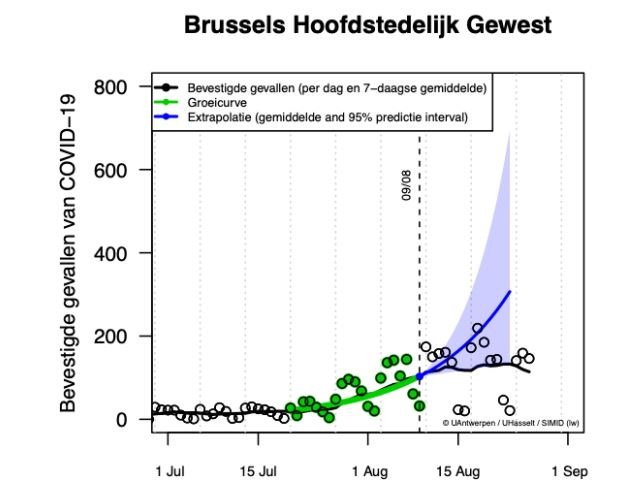The collective efforts of the population in Belgium to push back the coronavirus this summer have made a big difference in the falling number of new infections per day, health officials said during a press conference on Monday.
As the average number of new coronavirus cases per day has dropped by 14% compared to the previous week, the decrease is becoming more defined, "after fluctuating around 10% for a few days," said virologist and interfederal Covid-19 spokesperson Steven Van Gucht.
Researchers of the universities of Antwerp and Hasselt have modelled how the infection curves would have evolved if the initial increase had continued in July.
In Brussels, a significant rise in new infections was reported from around 27 July. "As the graph shows: without measures, there would have been more than 300 infections per day by 23 August, but because of the measures we currently have roughly 100 infections per day."
Related News
- Bursting the bubble: 5-person limit more of a guideline, Wilmès says
- Belgium's average of new coronavirus cases falls to 430 per day
- Coronavirus: Brussels records drop in new weekly cases at the weekend
For the Antwerp province, the curve of new infections started to turn around as of 26 July. "That is not self-evident," said Van Gucht. "Thanks to this collective effort, we have been able to avoid many hospital admissions and deaths."
Instead of an exponential growth that would normally have led to more than 700 new infections per day in Antwerp by 9 August, the curve has flattened and Antwerp remained below 300 new infections per day.
"We must not forget that this remains a hugely infectious virus, and that this reversal is not self-evident. Just think of the continuing increase in infections in a number of other European countries such as Spain and France."
"These graphs illustrate that we can beat the virus together, provided we show solidarity and perseverance. I am convinced that we will be able to do the same this winter," Van Gucht said. "The virus cannot think ahead, but we can."
Maïthé Chini
The Brussels Times

